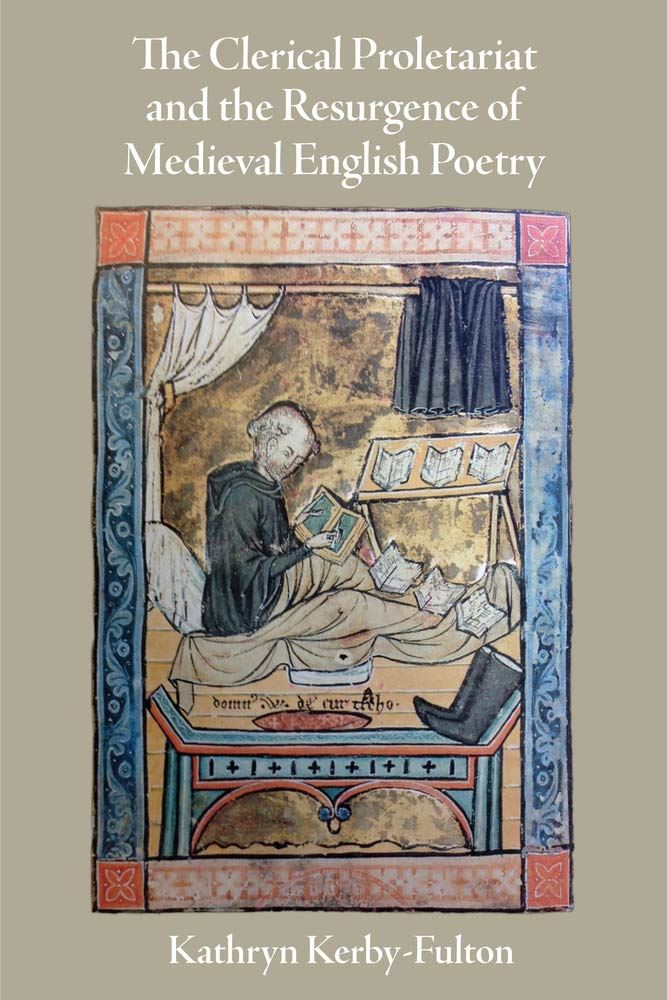The 2022 Margaret Wade Labarge Prize for best book in Medieval Studies was awarded to Kathryn Kerby-Fulton for her book The Clerical Proletariat and the Resurgence of Medieval English Poetry (Philadelphia: University of Pennsylvania Press, 2021).

In a masterful, paradigm-shifting study, Kathryn Kerby-Fulton delivers new insights about the importance to late medieval English poetry of the "invisible" medieval clerics in minor orders without benefices or established positions, the adjuncts of their time. This "clerical proletariat" lived and worked between the ecclesiastical and lay worlds. Underemployed and overeducated, their reaction to precarious working conditions and adversity exerted a transformational influence on medieval English literature and helped re-establish English as the dominant language of literary expression. In a field where so much has already been written, Kerby-Fulton refreshingly reorients the approach to lesser-known poets through this stellar example of historical literary criticism.
Congratulations to Dr. Kerby-Fulton! The committee thanks all the authors who submitted books for consideration. They provided the committee with ample and interesting reading, and their work is testimony to the excellent contributions of Canadians to research fields of the Middle Ages.

 Le prix Margaret Wade Labarge 2022 du meilleur livre en études médiévales a été attribué à Kathryn Kerby-Fulton pour son livre The Clerical Proletariat and the Resurgence of Medieval English Poetry (Philadelphie : University of Pennsylvania Press, 2021). Dans une étude magistrale, qui change de paradigme, Kathryn Kerby-Fulton offre de nouvelles perspectives sur l'importance pour la poésie anglaise de la fin du Moyen Âge des clercs médiévaux "invisibles" des ordres mineurs sans bénéfices ni positions établies, les adjuvants de leur temps. Ce "prolétariat clérical" vivait et travaillait entre le monde ecclésiastique et le monde laïc. Sous-employés et suréduqués, leur réaction aux conditions de travail précaires et à l'adversité a exercé une influence transformatrice sur la littérature anglaise médiévale et a contribué à rétablir l'anglais comme langue d'expression littéraire dominante. Dans un domaine où tant de choses ont déjà été écrites, Kerby-Fulton réoriente de façon rafraîchissante l'approche des poètes moins connus grâce à cet excellent exemple de critique littéraire historique.
Le prix Margaret Wade Labarge 2022 du meilleur livre en études médiévales a été attribué à Kathryn Kerby-Fulton pour son livre The Clerical Proletariat and the Resurgence of Medieval English Poetry (Philadelphie : University of Pennsylvania Press, 2021). Dans une étude magistrale, qui change de paradigme, Kathryn Kerby-Fulton offre de nouvelles perspectives sur l'importance pour la poésie anglaise de la fin du Moyen Âge des clercs médiévaux "invisibles" des ordres mineurs sans bénéfices ni positions établies, les adjuvants de leur temps. Ce "prolétariat clérical" vivait et travaillait entre le monde ecclésiastique et le monde laïc. Sous-employés et suréduqués, leur réaction aux conditions de travail précaires et à l'adversité a exercé une influence transformatrice sur la littérature anglaise médiévale et a contribué à rétablir l'anglais comme langue d'expression littéraire dominante. Dans un domaine où tant de choses ont déjà été écrites, Kerby-Fulton réoriente de façon rafraîchissante l'approche des poètes moins connus grâce à cet excellent exemple de critique littéraire historique.
Félicitations à Mme Kerby-Fulton ! Le comité remercie tous les auteurs qui ont soumis des livres pour examen. Ils ont fourni au comité une lecture abondante et intéressante, et leur travail témoigne de l'excellente contribution des Canadiens aux domaines de recherche du Moyen Âge.
